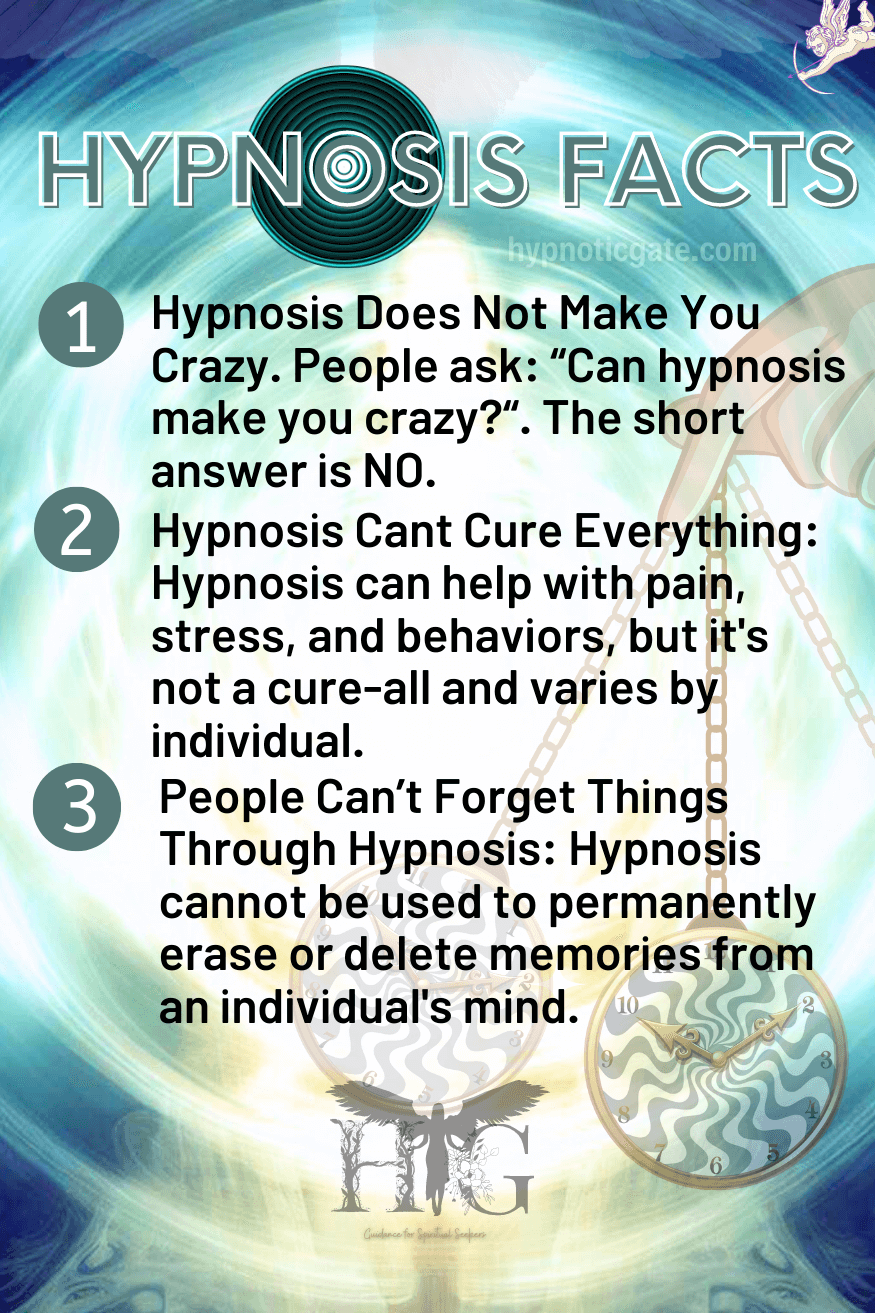
Hypnosis is a powerful tool and not a magical solution to mental illness but it has limitations. It is important to note that a person cannot be hypnotized to do something against their will, despite the widespread assumption that they can. Many believe they will become zombie-like when undergoing hypnosis, but this is untrue.
You can’t coerce someone into a hypnotic state. You embrace hypnosis. This is the deliberate manipulation of one’s state of the conscious mind.
Here Are Three Engaging Hypnosis Facts
- Mind-Body Connection: Hypnosis can help manage pain, stress, and specific behaviors by tapping into the subconscious mind.
- Memory Limits: Despite popular myths, hypnosis cannot permanently erase or delete memories.
- Not for Everyone: The effectiveness of hypnosis varies from person to person; it’s not a one-size-fits-all solution.

Nonetheless, skeptics fear you’ll lose control, go crazy, and develop psychosis. Certainly not. That’s why we write high-quality hypnosis articles answering the question: Can Hypnosis Help People Change How They Act?
There are certain things we will explain hypnosis can’t do. But before, knowing that “hypnosis benefits” is more vital. Here is a List of things hypnosis can help with:
- Anxiety
- Pain due to burns
- Irritable bowel syndrome
- Asthma.
- Chronic pain.
- Fears and phobias.
- Smoking.
- Alcohol Addiction
However, before deep-dive into how hypnosis works, you should check it. Because people have a lot of skeptical thoughts about how hypnosis works and false ideas about hypnotic trance state.
Related: What are the myths and false ideas about hypnosis?
1- Hypnosis Does Not Make You Crazy or a Zombie.
People ask: “Can hypnosis make you crazy?“. The short answer is NO.
But certain people might be affected by hypnosis more. But most people have some degree of resistance to hypnosis and hypnotic suggestions.
Some specific mental illnesses can be negatively affected by hypnosis.
Additionally, some specific mental illnesses may be negatively affected by hypnosis. If you already have these mental health issues, hypnosis may sometimes make them worse. However, it’s important to note that hypnosis can also benefit some individuals. For example, some people have reported benefits in their weight loss, quitting smoking, and overcoming fears through hypnosis.
2- Hypnosis Cant Cure Everything
There is a common misconception that hypnosis requires the hypnotist’s mind control or “magic” and that they possess some ability to hypnotize anyone. However, this is not the case. Most people cannot be hypnotized, and those resistant to hypnosis will not be affected by it.
While hypnosis can benefit certain issues, such as quitting smoking, losing weight, or overcoming fears, it is not a cure-all for mental disorders like deep-seated fears and low self-esteem. Combining hypnosis with proper diet, meditation, sleep, supplements, and breathing exercises is important to take complete control of your body and your life.
Hypnosis, including deep fears, self-esteem issues, eating disorders, and other mental disorders, can’t cure everything. However, combining hypnosis with a proper diet, meditation, deep sleep, supplements, and breathing exercises can help you gain better control over your life and body.
Can Anyone Be Hypnotized?
While most people can be hypnotized to some degree, a small percentage of the population resists hypnosis. It depends on the hypnosis session and hypnotherapy techniques and how trained the therapist is.
Also, the more bad habits spend years, the harder you get hypnosis work and perform in your case. You can immediately heal with just one hypnosis session. Our unconscious mind needs to be a reputation for rewiring unconscious urges. Besides, our traumatic experience determined how hypnotherapy succeeds.
The unconscious mind controls our free will, and automatic cravings take place. We need to be meditative and heightened to rewire and get hypnotherapy work. Otherwise, we can’t fight root causes and positive behavior changes. For that reason, hypnosis works if you can easily put yourself into a trance-like state. Now, people can easily find underlying issues with that states and change unwanted thoughts in that altered state.
3- People Can’t Forget Things Through Hypnosis.
Hypnosis is often used to treat anxiety, phobias, and addictions and to help with sleep problems, help with pain management. It can also be used for performance improvement and to enhance creativity.
People who do not know much about hypnosis are led to assume that they forget what occurred during the hypnosis session when they come out of it. Although it is conceivable, it doesn’t happen very often.
Most individuals recall everything that was stated to them while they were hypnotized. Stage performances where participants claim they remain aware but are unconscious minds don’t recall what they did while hypnotized keep this concept alive. People often say these things to uphold their pride.
Most performers on stage don’t trance out long enough for posthypnotic amnesia to occur.
The purpose of the stage hypnotist’s performance is to amuse audiences, not to dispel any existing preconceptions about hypnosis. The players perpetuate this fiction by pretending they can’t recall what they performed on stage.
What Happens When You’re Hypnotized?
The brain areas can change through self-hypnosis, which is a method of inducing mental calm and concentration. While in this condition, your mind will be relaxed, focused attention, and receptive to suggestions in a way that’s comparable to being asleep. It is said that when you are in such a condition of calm, your subconscious mind is more accessible.
You understand that you can be more receptive to ideas when under hypnosis.
A complete set of sessions may help people reclaim control instead of having power stolen away from them.
- Your brain waves become theta and alpha brain waves during hypnosis, and you feel calm and relaxed. Also, when you are in the Theta Brain Waves”, it’s more likely you are “open to hypnotic suggestions.”
- Hypnotic suggestions have been shown to produce dynamic changes in brain activity. A cognitive connection between the anterior cingulate cortex (ACC) and the vast neural network is altered during hypnosis, and the areas of the brain involved in processing cognition and emotion exhibit increased activity.
- Your cortisol level starts to drop, which leads to more trust in the environment. Because cortisol is the “stress” hormone, it will make you feel anxious if it’s too high and activate to “fight” or “flight” response. You need to control your cortisol level; hypnosis is good. When cortisol is “low” because of hypnosis, you will feel more “connected” because you won’t need to “run away” from any potential fear. Right?
Self-hypnosis is a great way to start experiencing hypnosis and hypnotic trance. You need one headphone and a guided hypnosis mp3.
You don’t need to do anything special to prepare for self-hypnosis. However, dressing comfortably is a good idea. Hypnosis sessions can vary but typically last between 30 minutes to an hour. Additionally, to avoid nodding off, make sure you get enough sleep the night before the session.
Who Can and Can’t Be Hypnotized?
Some people are more susceptible to it than others. Generally, anyone with an average IQ and the ability to concentrate and follow instructions can be hypnotized, but some individuals may be more resistant.
People who are highly skeptical or resistant to hypnosis, people who have a strong will, and those who are afraid of losing control are often more difficult to hypnotize. Additionally, individuals with certain mental disorders or those under the influence of drugs or alcohol may not be good candidates for hypnosis.
On the other hand, open-minded people who have vivid imaginations and desire to experience hypnosis can be more easily hypnotized. Additionally, people experiencing stress, anxiety, or other negative emotions may be more open to hypnosis for relaxation and stress relief.
What Happens When You’re Hypnotized?
The brain areas can change through self-hypnosis, which is a method of inducing mental calm and concentration. While in this condition, your mind will be relaxed, focused attention, and receptive to suggestions in a way that’s comparable to being asleep. It is said that when you are in such a condition of calm, your subconscious mind is more accessible.
You understand that you can be more receptive to ideas when under hypnosis.
A complete set of sessions may help people reclaim control instead of having power stolen away from them.
- Your brain waves become theta and alpha brain waves during hypnosis, and you feel calm and relaxed. Also, when you are in the Theta Brain Waves”, it’s more likely you are “open to hypnotic suggestions.”
- Hypnotic suggestions have been shown to produce dynamic changes in brain activity. A cognitive connection between the anterior cingulate cortex (ACC) and the vast neural network is altered during hypnosis, and the areas of the brain involved in processing cognition and emotion exhibit increased activity.
- Your cortisol level starts to drop, which leads to more trust in the environment. Because cortisol is the “stress” hormone, it will make you feel anxious if it’s too high and activate to “fight” or “flight” response. You need to control your cortisol level; hypnosis is good. When cortisol is “low” because of hypnosis, you will feel more “connected” because you won’t need to “run away” from any potential fear. Right?
Self-hypnosis is a great way to start experiencing hypnosis and hypnotic trance. You need one headphone and guided hypnosis mp3.
You don’t need to do anything special to prepare for self-hypnosis. However, dressing comfortably is a good idea. Hypnosis sessions can vary but typically last between 30 minutes to an hour. Additionally, to avoid nodding off, make sure you get enough sleep the night before the session.
Who Can and Can’t Be Hypnotized?
Some people are more susceptible to it than others. Generally, anyone with an average IQ and the ability to concentrate and follow instructions can be hypnotized, but some individuals may be more resistant.
People who are highly skeptical or resistant to hypnosis, people who have a strong will, and those who are afraid of losing control are often more difficult to hypnotize. Additionally, individuals with certain mental disorders or those under the influence of drugs or alcohol may not be good candidates for hypnosis.
On the other hand, open-minded people who have vivid imaginations and desire to experience hypnosis can be more easily hypnotized. Additionally, people experiencing stress, anxiety, or other negative emotions may be more open to hypnosis for relaxation and stress relief.
Facts About Hypnosis
Despite what you may have seen in movies or on TV, hypnosis cannot force you to do something you don’t want. Hypnosis works by helping you access your subconscious mind, where your thoughts, beliefs, and emotions are stored. The skilled hypnotist can then make suggestions to your subconscious mind, but ultimately, you have the power to accept or reject those suggestions. You will not act on a suggestion that goes against your values or beliefs, even if you are hypnotic.
Hypnotherapy has several advantages. Nonetheless, this medicine cannot be used to make cancer patients cure ill health. Unfortunately, you cannot eliminate disease or tumors.
More information: Hypnosis Preparation: What You Need to Know.
Source: https://www.mayoclinic.org/tests-procedures/hypnosis/about/pac-20394405
Hypnotherapy has several advantages. Nonetheless, this medicine cannot be used to make cancer patients cure ill health. Unfortunately, you cannot eliminate disease or tumors.
More information: Hypnosis Preparation: What You Need to Know.
Source: https://www.mayoclinic.org/tests-procedures/hypnosis/about/pac-20394405
